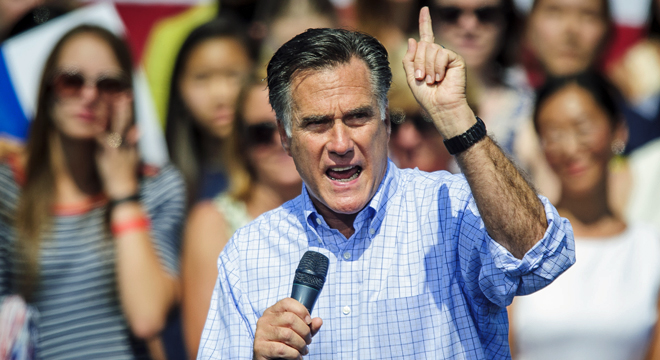Under fire from Mitt Romney for being too lenient with China’s questionable trade practices, President Obama issued a trade complaint to the World Trade Organization on Monday against the country’s practice of subsidizing cars and auto parts for export.
The development, and Romney’s reaction to it, perpetuate a theme that has characterized the campaign for months. Each candidate has scorched the other for supporting trade policies that harm American workers, though substantively it’s hard to find daylight between the two on how they intend to deal with China tilting the playing field.
“Today, my administration is launching new action against China — this one against illegal subsidies that encourage companies to ship auto parts manufacturing jobs overseas,” Obama said at a campaign stop in Cincinnati, Ohio. “Those subsidies directly harm working men and women on the assembly line in Ohio and Michigan and across the Midwest. It’s not right; it’s against the rules; and we will not let it stand.”
The rollout of the policy — in the industrial heartland where manufacturing workers blame China for rigging the game against them — was unmistakably political. Romney, who has run ads in the Midwest pounding Obama on the issue, said the move was “too little, too late.” Conservatives give Romney credit for Obama’s move, although the Republican nominee’s campaign declined to say whether the the move is a step in the right direction or what his approach would be.
“President Obama has spent 43 months failing to confront China’s unfair trade practices,” Romney said in a statement. “Campaign-season trade cases may sound good on the stump, but it is too little, too late for American businesses and middle-class families. President Obama’s credibility on this issue has long since vanished. I will not wait until the last months of my presidency to stand up to China, or do so only when votes are at stake. From Day One, I will pursue a comprehensive strategy to confront China’s unfair trade practices and ensure a level playing field where our businesses can compete and win.”
Romney’s own opaque platform on China’s trade policies make it difficult to know what he would do differently as president.
“I basically view what the president is talking about — and for that matter Romney’s talking about — as consistent with fair trade,” said Jared Bernstein, an economist at the liberal-leaning Center on Budget and Policy Priorities who used to work in the Obama White House. “But I don’t know what [Romney’s] position is on Chinese subsidies [for auto exports].”
So what does Obama’s latest move hold in store for U.S. auto workers?
Very little, if anything, in the near term. But experts say the president’s action is the latest in a series of rebukes of China’s dodgy trade practices that could have a cumulative impact in helping level the playing field over time.
“There is a pattern here if you look over the past 18 months,” said Edward Alden, a trade expert at the Council on Foreign Relations. “There has been a real acceleration of real administrative trade action aimed at China. So I think we are seeing here a pretty determined effort — probably accelerated by the political scene — to try to challenge China. … This is one practice that is clearly prohibited by the WTO.”
The episode also reflects the utility of incumbency to fend off political attacks.
“I think it’s a mixture of both [politics and policy],” said Alden. “The fact that it was announced when it was and where it was suggests there’s an obvious political motivation. But there are real substantive issues here.”






